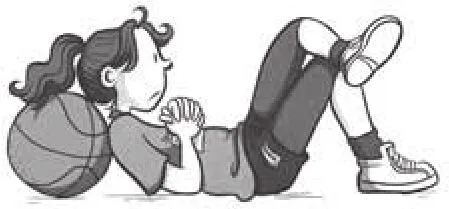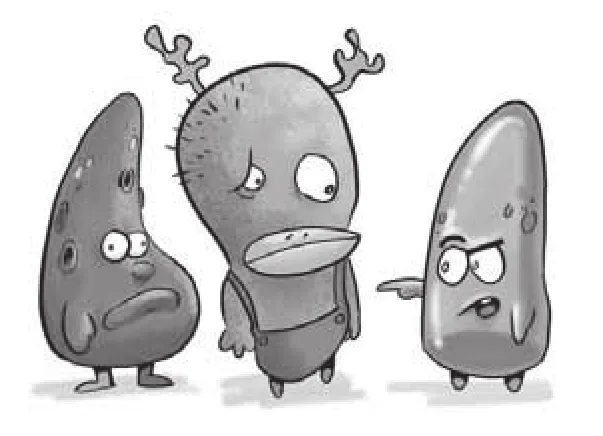口语步步高(十四)
2017-11-10张新峰供稿
张新峰 供稿
口语步步高(十四)
张新峰 供稿
一 功 ◆ 能 ◆ 口 ◆ 语
在日常生活中,我们经常会遇到“归谁所有”的问题,这时候我们就需要学会确认物品所属的表达方式。
1 确认物品所属的表达方式
常考口语⇁
—Is this your pencil? 这是你的铅笔吗?
—Yes, it is./No, it isn’t. 是的。/不是的。
—Is that your backpack? 那是你的背包吗?
—No, it isn’t. 不是。

免费套餐⇁
—Is that his book? 那是他的书吗?
—Yes, it is./No, it isn’t. 是的。/不是的。
—Is that my cup? 那是我的杯子吗?
—No, I think it’s his cup. 不,我认为是他的。
—Excuse me. Are these our apples? 请问,这些是我们的苹果吗?
—Yes, they are. 是的。

快乐剧场⇁
A: Are these our books?
B: No, they aren’t. They are their books.
A: Are those our books?
B: Yes, they are. Here you are.
A: Thank you.

背景知识⇁
1) 上述句子中的your、his、my、our等词是形容词性物主代词,多用来表明物品的所属,其后必须接名词。
2) 指示代词these与those指代可数名词复数。如:These are my books.(这些是我的书。);Those are Lily’s pencils.(那些是莉莉的铅笔。)
3) 在提醒对方注意或准备打扰某人时,西方人一般会先说“Excuse me.”。
2 确认他人身份的表达方式
当我们不认识某人时,我们通常会说“你是……吗?”。在与朋友见面时,人们通常要将自己的朋友介绍给其他人,以便相互认识。那么,确认他人身份的表达方式用英语应该怎样说呢?
常考口语⇁
Is she your sister? 她是你的姐姐吗?
Yes, she is. 是的,她是。
Are they…? 他们是……吗?
No, they aren’t. 不,他们不是。
She is (She’s)… 她是……
He is (He’s)… 他是……
Is Guo Peng your brother? 郭鹏是你的弟弟吗?

免费套餐⇁
Are you…? 你是……吗?
Yes, I am…/No, I’m not… 是的,我是……/不,我不是……
This is my friend, Mr./Mrs./Miss… 这是我的朋友,……先生/夫人/小姐。
You look like… 你看起来像……
I think so./I don’t think so. 我也这么觉得。/我不这么认为。
Who are/is you/he/she? 你/他/她是谁?
I’m (He/She is)… 我(他/她)是……

快乐剧场⇁
A: Excuse me. Are you Mr. Liu Hua from Beijing?
B: Yes, I am.
A: Is the man over there your father?
B: No, he isn’t. I don’t know him.
A: Then who is that man?
B: He looks like Mr. Brown.
A: I don’t think so.

背景知识⇁
1)“Are you…?”是当面确认他人身份最常用的句式,更礼貌的可用“Excuse me. Are you…?”发问。如果是向其他人确认某人,则可用“Is he/she…?”。
2)“Who are/is you/he/she?”是直接正式确认某人身份的句式,其答语通常为“I’m (He/She is)...”。

二 口 ◆ 语 ◆ 一 ◆ 点 ◆ 通
1 Do you have a minute? 能耽搁你/您一分钟吗?
本句为表“打扰某人一会儿”的礼貌用语,可能是有事情要与对方商量,或者是想麻烦对方做某件事情,与“Do you have a second?”意思相同。
A: Do you have a minute, Professor Williams?
威廉姆斯教授,能耽搁您一分钟吗?
B: Sure. 当然可以。
A: I don’t understand this part of the assignment. Could you explain it to me?
我不太了解这部分的任务。您能为我说明下吗?
B: No problem. 没问题。
【常用口语】
You got a minute? 耽搁你一分钟好吗?
Could you spare me a minute? 能为我腾出一分钟吗?
【特别提醒】
上述用语中,我们可以用second来替换minute,其意思没有多大差别。如“wait a second”与“wait a minute”均可引申表示“等会儿,且慢”。


2 Where are you from? 你/您来自哪里?
本句为初次见面时的常用语,意为了解对方的背景,如籍贯、家乡或出生地等,以逐渐建立起良好的友谊。
A: Where are you from? 您来自哪儿?
B: I’m from Guangdong. 我是广东人。
A: Where in China is Guangdong? 广东位于中国哪里?
B: It’s in the south of China. 它位于中国南部。
【常用口语】
Where do you come from? 你来自哪里?
Where do you work? 你在哪儿工作?
【特别提醒】
“Where do you come from?”与“Where did you come from?”的意义并不相同。前者等于“Where are you from?”,表“你来自哪里?”;而后者意为“你刚从哪儿过来?”,回答类似于“I just came from the department store.(我刚从百货公司过来。)”。

3 Look at the time. 瞧瞧时间。
与朋友闲聊时,若对方是个windbag(饶舌之人)或chatterbox(喋喋不休之人),说话冗长繁复又毫无内容,让你想要脱身,则可委婉地使用本句。
A: Wow! Look at the time. It’s about 11 o’clock. 哇!瞧瞧时间。快要十一点了。
B: Really? I didn’t realize it was so late. 真的吗?我不知道已经这么晚了。
A: I’ve got to catch the last bus. See you later. 我必须去赶搭末班公交了。再见。
【特别提醒】
上述对话中,catch表“赶搭”,而若要表示一般的“搭乘”,则使用take。

